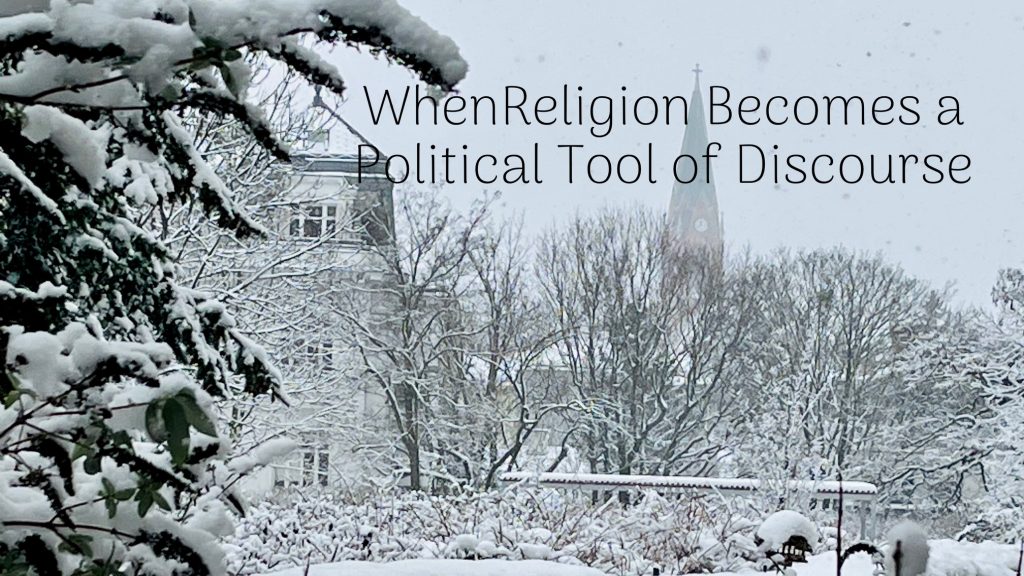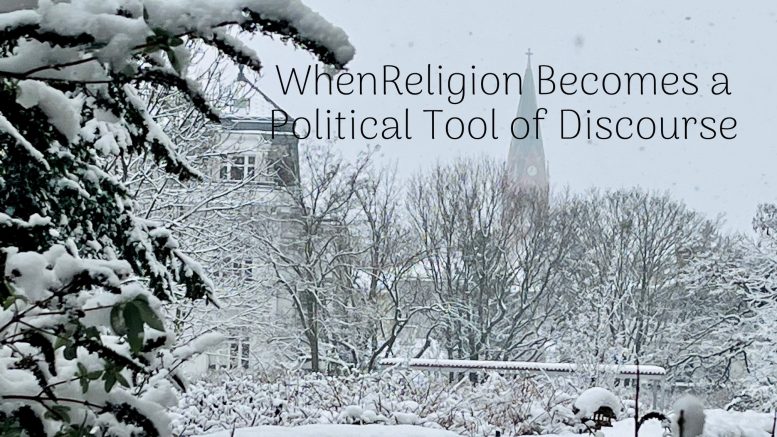
When Religion Becomes a Political Tool of Discourse
All religions strive for peace with good will, but the way to the goal is diverse. While Buddhism normally finds it no obstacle to assimilate into a new culture to bloom, some others stick to the orthodox teachings to survive. For the latter, a new environment might be a big challenge for them, sometimes at the border of toleration.
During the course of human civilization, however, mutual influences of Hinduism, Buddhism, Judaism, Christianity and Islam have never ceased to take place, via global trade routes, immigration, official visits or localization of holy teachings. Pious religious members have been bringing religious beliefs and practices to far-away communities for thousand years. Thus, a religion moves into a new culture, blending with indigenous religions in a pluralistic fashion, sometimes even dominating the original. Beyond doubt, localization of a religion is one of the best way to preserve it, which requires the newcomer to pay respect to the local law. Mutual respect under the concrete law of the settled country is the best practice for all religious groups. Singapore is a good example for it.
On the other hand, many formerly very local religious groups find a worldwide membership nowadays due to accelerated globalization. Localization and globalization function like two sides of a coin. Buddhism has won the hearts of many Europeans while Protestantism has become the faith of many Asians. All that happened without political interference. In the eyes of cultural anthropologists, as a matter of fact, no world religion can exist as a single, homogeneous entity. They compromise local variants anyways.
To maintain a balance between standardization based on core beliefs and the local variant is, however, a challenge for many religious groups. It requires a lot of intercultural understanding within the civil society. Unfortunately, here comes the play of politicization of religion at the backdrop of today’s geopolitics. Once religion is politicized, it’ll not only “contribute to greater political polarization, but also diminishes the ability of religious leaders to speak prophetically on important public issues”, wrote the Canadian political scientist David E. Campbell in his work “The Perils of Politicized Religion”.
In his abstract, Mr. Campbell stated that in the United States, religion and partisan politics have become increasingly intertwined. The rising level of religious disaffiliation is a backlash to the religious right: many Americans are abandoning religion because they see it as an extension of politics with which they disagree.
Today’s politicization of religion has yet another property worth investigating, i.e., the discourse orientation. It is a not-to-be-ignored factor in shaping the world order. Looking back into history, dozens of Crusades, the half-millennium-long inquisition, the Holocaust during World War II, are all evidence of devastation with religious background. Today, however, the world is more concerned with the practice of some extremists in the name of religion. The consequences of burning certain religious symbols could prove to be as severe as no less than brutal terror attacks and even mass atrocities. With the so-called religious justification at the cost of other people’s rights or even life, today’s world is more than ever in dilemma. The terror attack in Vienna on 2. November 2020, where the author resides, shocked the security forces of this relaxed and seemingly untouchable capital of music.
When security issues become priority, related legal measures take place. In Austria, elementary school students are no longer allowed to cover their heads with a headscarf at school. If they do, their parents face an administrative fine of €440. This was decided by the National Council several years ago. In most federal states, female judges, public prosecutors and trainee lawyers are not allowed to wear a headscarf when performing their official duties in the courtroom. Meanwhile, the European Court of Justice (ECJ) in Luxembourg has also decided that under certain circumstances, companies can prohibit their employees from wearing religious symbols such as the headscarf.
The legal enforcement is a way of defining the social climate, of guaranteeing the social security, while allowing a religion to practice under the local law.
There is a Berkley Center of Georg Town University which holds forums on questions like what historical, sociological, or theological factors help to explain the contemporary relationship between religion and politics in various national contexts, how does religion and nation-state formation impact critical issues, from national governance to international relations, how does the interface between religion and nationalism affect religious or ethnic minorities in different countries, and if the relationship between religion and nation-state is often seen as a source of conflict, is there a way to foster a more inclusive vision of religion in the public square, and so on.
Talking about the relationship between religion and nationalism, the forum mentioned that at home, the United States has also seen the relationship between religion and nationalism play out on the public stage, including recent displays of both white Christian nationalism and civil religion surrounding the 2020 presidential election. But coming to the analysis of other countries’ situation, this academic platform seems to sometimes judge from a self-assumed moral high ground without bothering looking deeper into the mentality of other cultures, thus failing to interpret the related policy. Again, questions like if the U.S. government should place greater pressure on another country to advance religious freedom could easily be taken advantage of by the government to politicize religion in the geopolitical context.
In 1802, Thomas Jefferson wrote a letter to the Danbury Baptist Association, referencing the First Amendment to the United States Constitution: “I contemplate with sovereign reverence that act of the whole American people which declared that their legislature should ‘make no law respecting an establishment of religion, or prohibiting the free exercise thereof,’ thus building a wall of separation between Church and State”. Considering the ever-polarizing world today, the wall is being smeared by various political discourses using religion as a tool of geo-political leverage. Today’s religious events, to be honest, are often influenced by the worldly politics. Instead of following its initial spiritual goal of advocating peace and cultivating mind, religious views have to struggle with potential political implications, which is a pity.
(Helen M. Vienna 20230131)


Be the first to comment on "When Religion Becomes a Political Tool of Discourse"